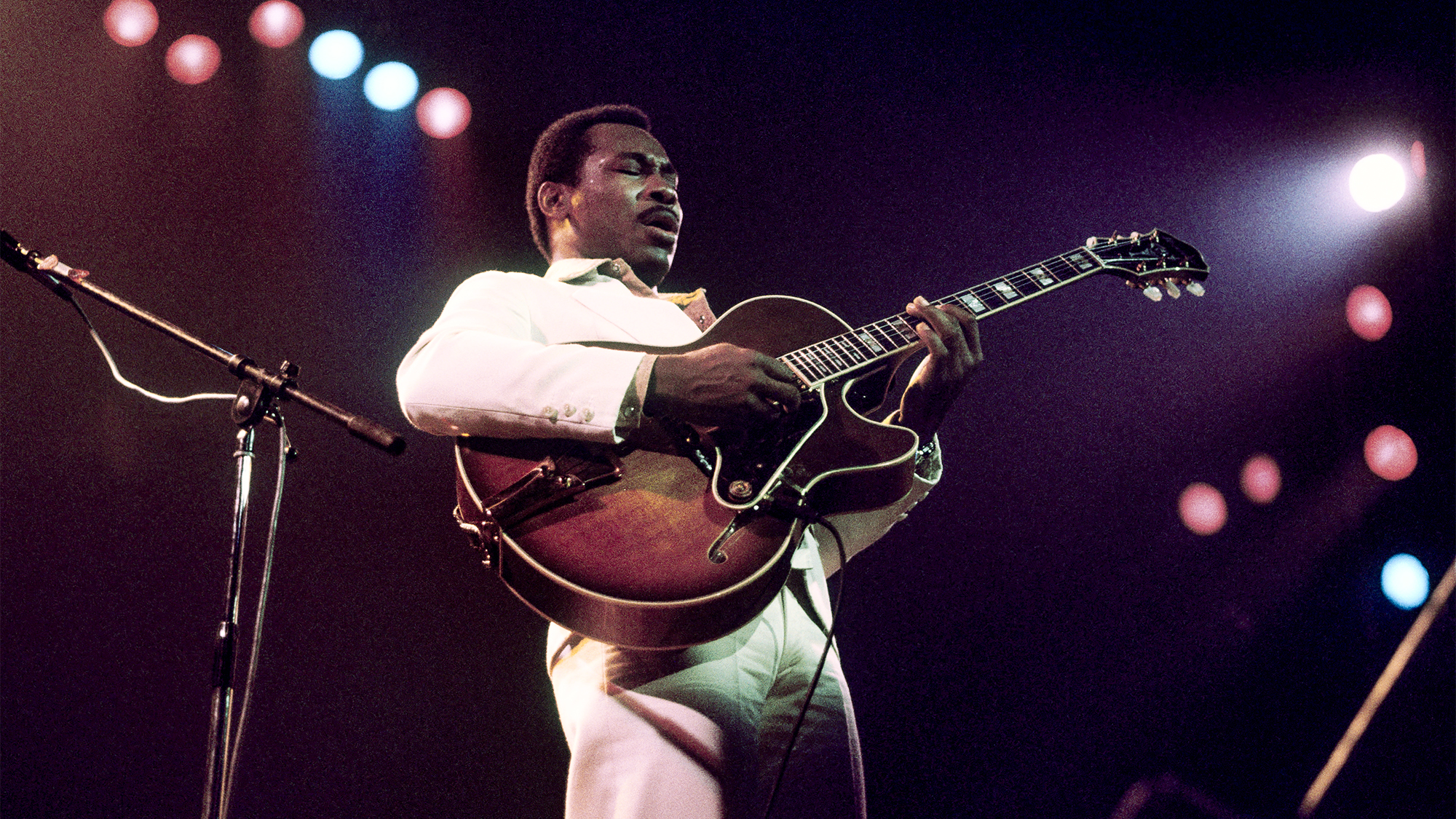Best guitar cables: hard-working cables that will preserve your tone
The ultimate plug in and play guide: these are the best guitar cables from the likes of Mogami, Ernie Ball, D’Addario and more
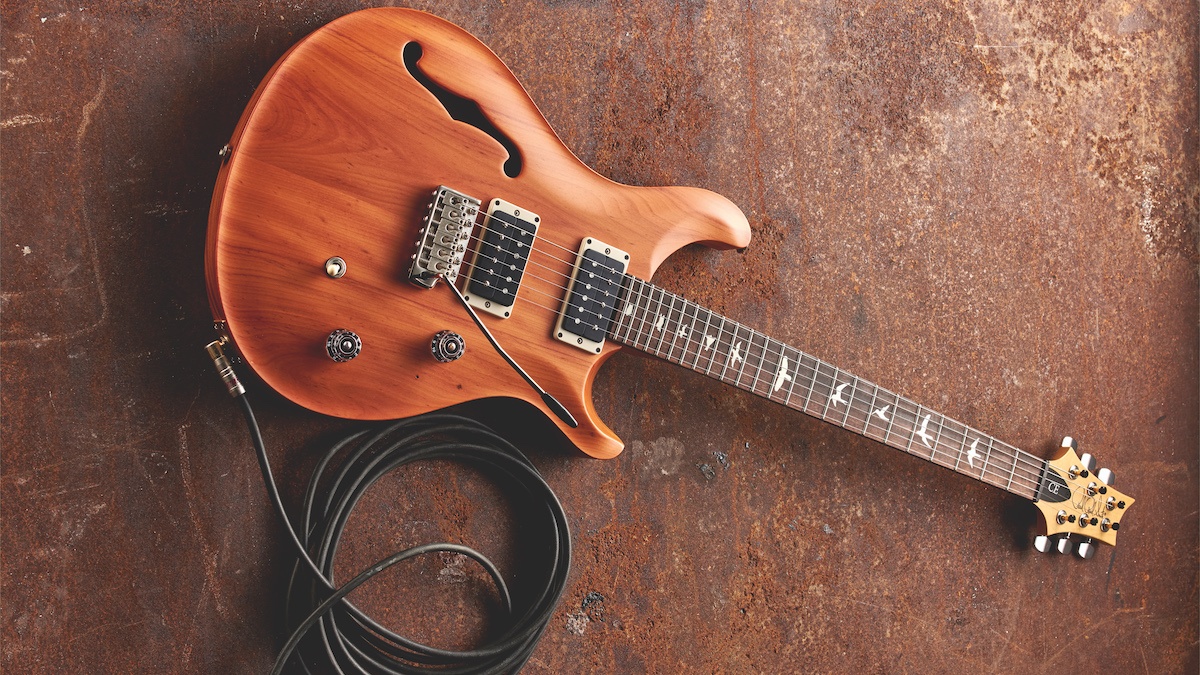
All the latest guitar news, interviews, lessons, reviews, deals and more, direct to your inbox!
You are now subscribed
Your newsletter sign-up was successful
Your guitars, amps and pedals make up the majority of your sound, but you’re only as strong as your weakest link. That’s why it’s always worth getting the best guitar cables that you can afford. Good cables will help keep your tone pure, can be relied upon night after night and should last a good long time.
Cables come from a variety of brands, and span a wide range of prices. Cables should let you sound like you, and will need to be whatever length your circumstances require (or maybe even a touch longer).
It doesn’t matter whether you’re playing in your bedroom or on stage, decent cables are always a must!
While guitar cables won’t necessarily make your rig sound any better, bad cables will make it sound worse. They don’t contribute to your tone as such, but if they’re high capacitance or poorly made or shielded, then you might find that you’re losing top end frequencies or getting unwanted noise.
For not a lot of money, you can pick up a good quality guitar cable that’s going to keep your tone intact, and likely last you a good few years - and my first pick goes to the Mogami Gold Series guitar cable for its impeccable construction and excellent sound transfer.
Myself and the wider Guitar Player team have tested countless cables and scoured the market to bring you the best guitar cables currently available for a range of players and budgets.
The quick list
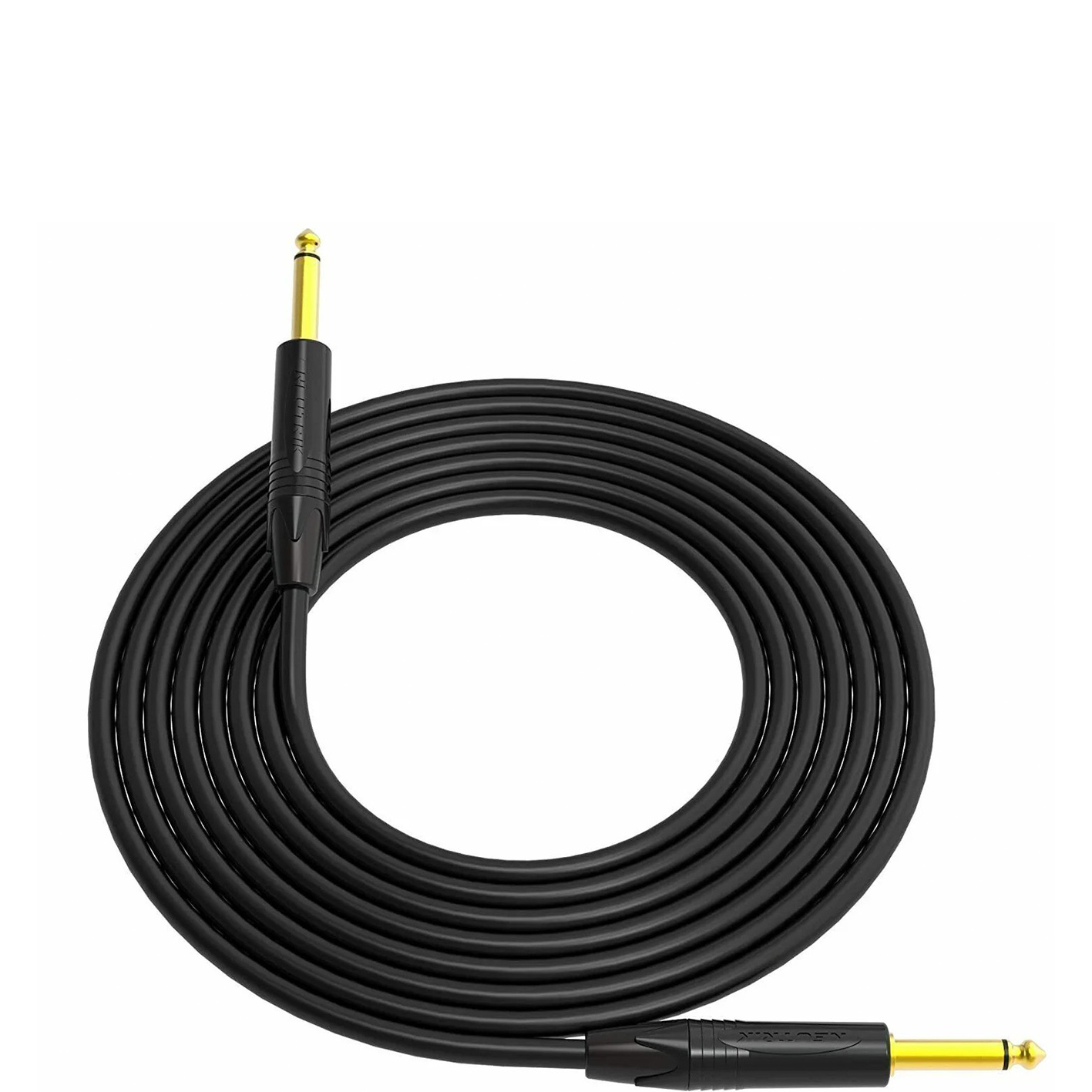
The Mogami Gold Series is widely regarded as the best guitar cable on the market for good reason, thanks to high-quality construction, excellent sound transfer and lifetime warranty. It features a heavy gauge, oxygen-free copper core with an ultra-high density spiral shield, which means minimum interference in your guitar signal.
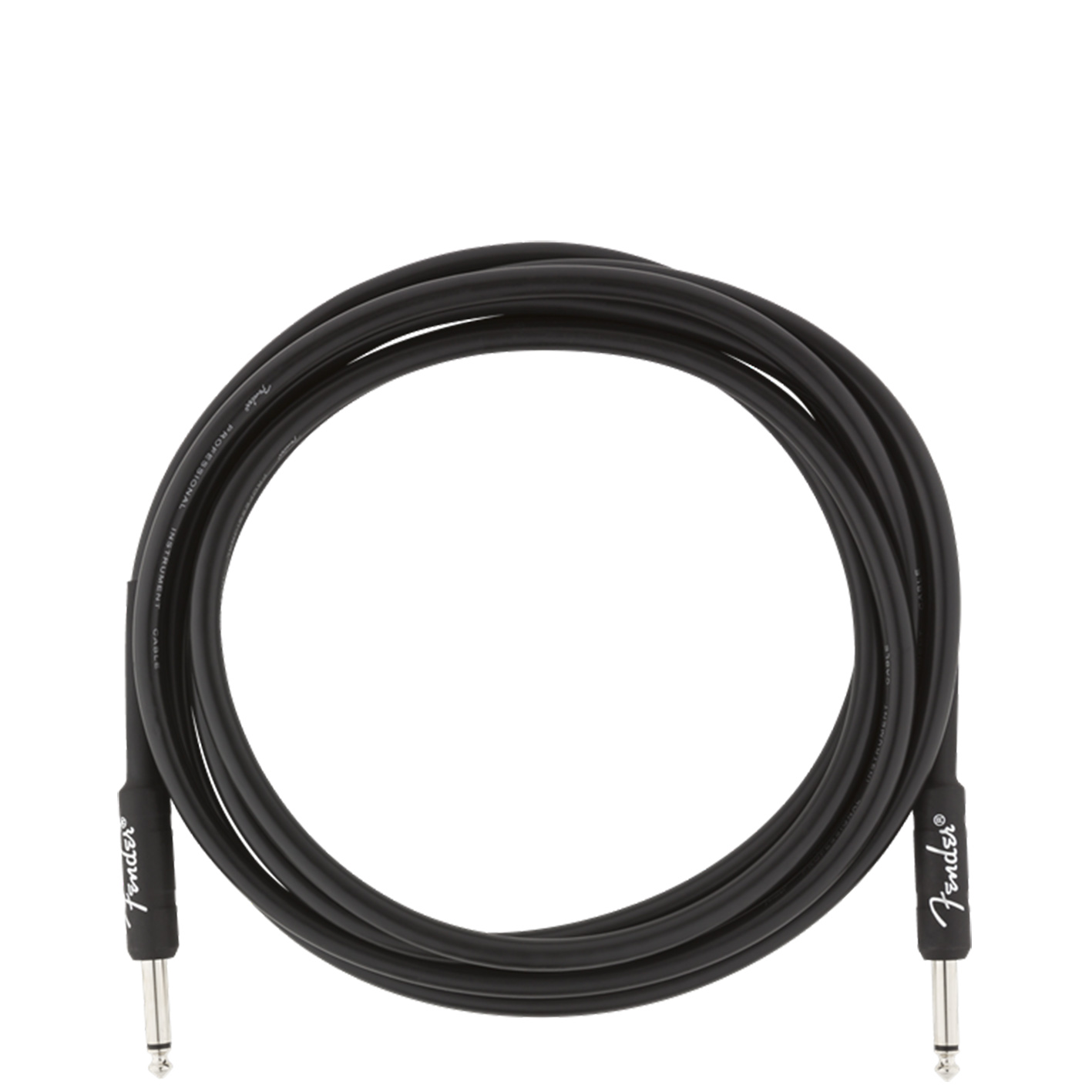
Fender Professional Series cables provide players with a cost-effective option for all their cabling needs. The wide gauge of this cable offers a reassuring feel, despite its low price compared to some of the other cables on this list. The outer PVC jacket also has a ‘physical memory’ to prevent it from getting tangled, no matter how badly you wrap it up after rehearsal.
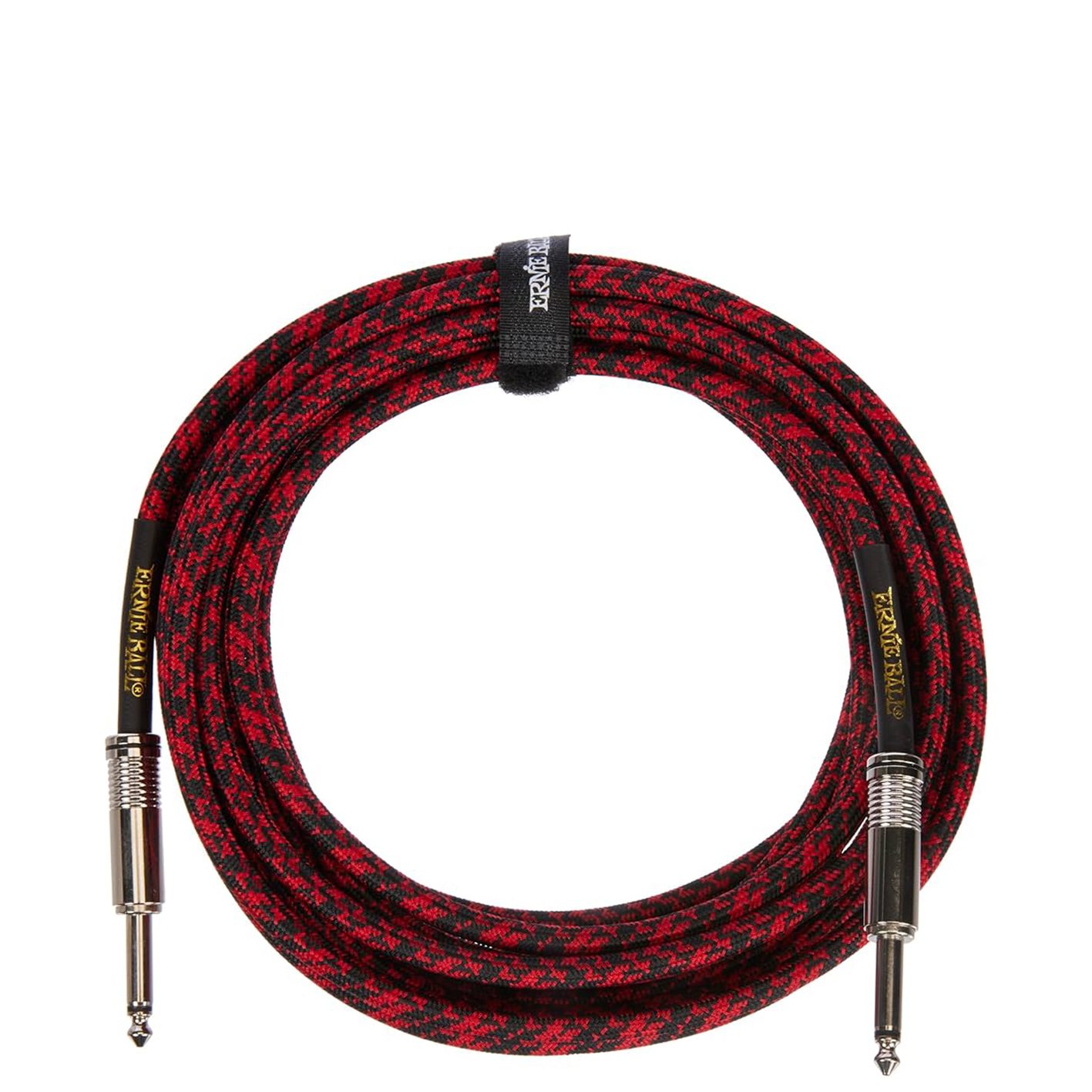
The Ernie Ball Braided Cables eschew the tired old black cable aesthetic for something far edgier with a hige range of vibrant color options. Braided cables are also far more resistant to tangling than their PVC-covered cousins while also offering a reliability upgrade due to the hardy exterior – ideal for life on stage.
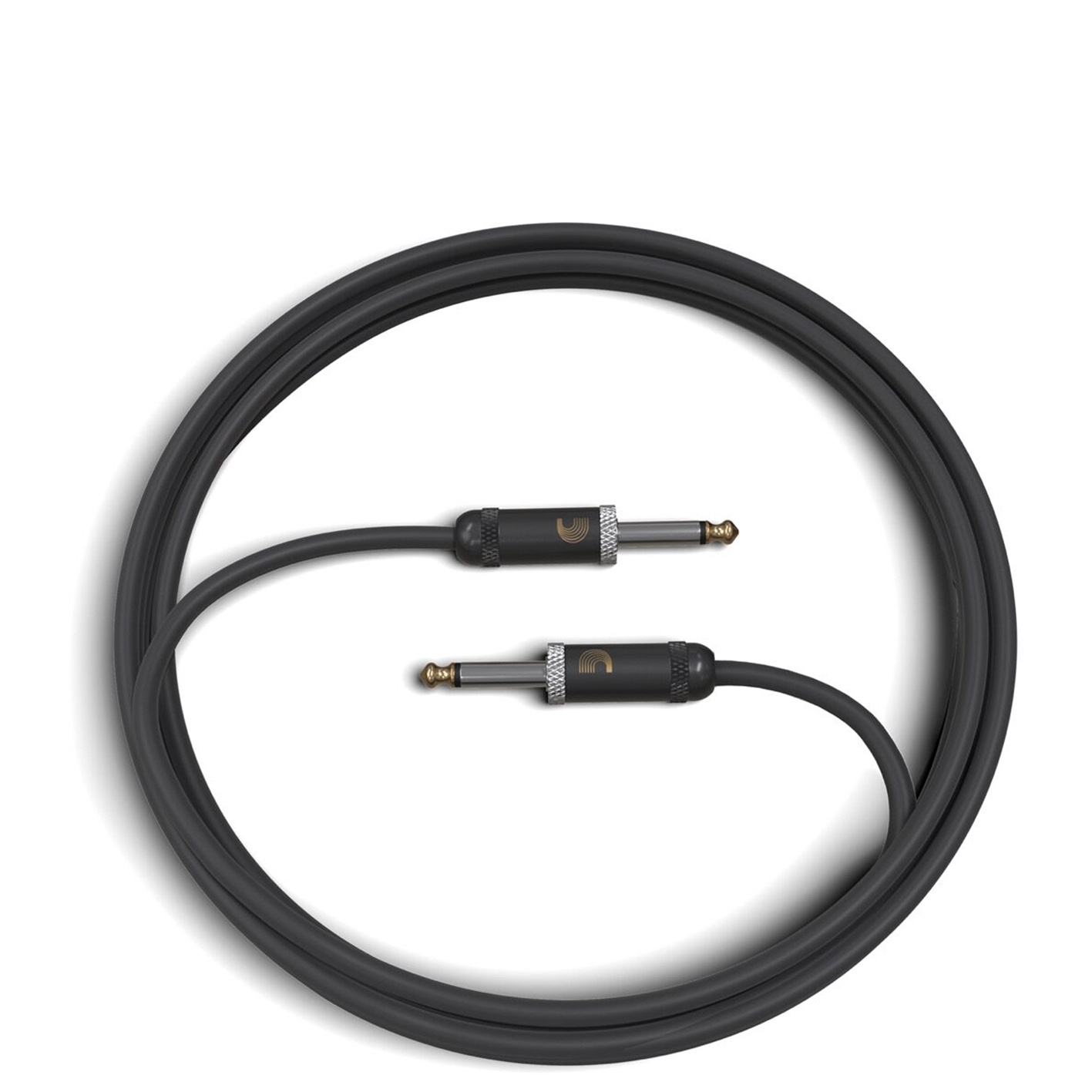
The best feature of the American Stage cable is its connectors. Neutrik is widely acknowledged as producing the best in the business. The Geo Tip connectors on offer ensure a rock-steady connection, no matter what kind of guitar you play. The connectors use HelioFused soldering to connect the inner cabling for added reliability.
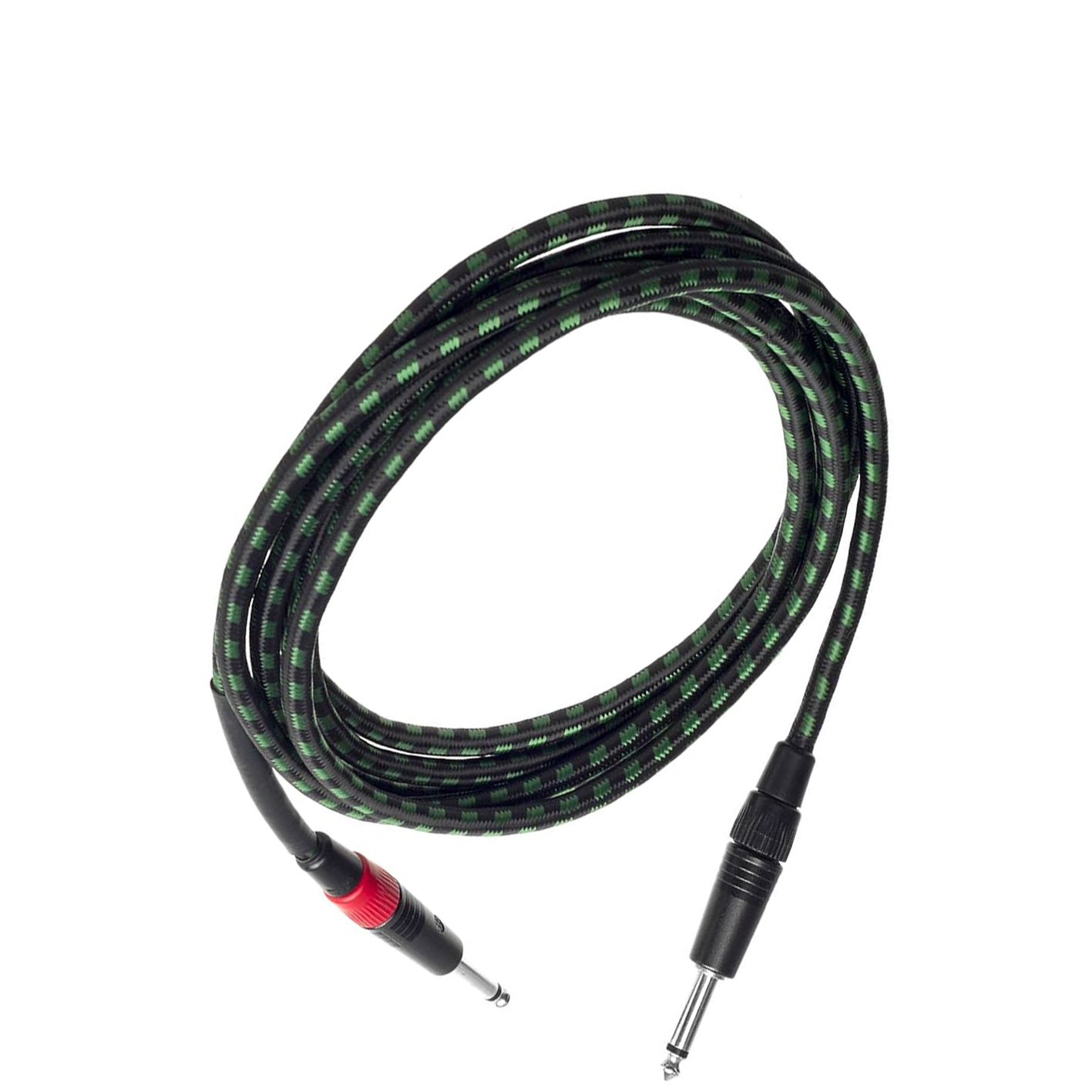
When you’ve got endorsements from Dave Gilmour, Jeff Beck and Guthrie Govan, you know you’re doing something right. Evidence Audio’s Lyric HG guitar cable is a premium offering for guitarists that take their tone seriously. The dual solid core is made of refined IGL copper which is what gives this cable its incredibly transparent tone transfer.
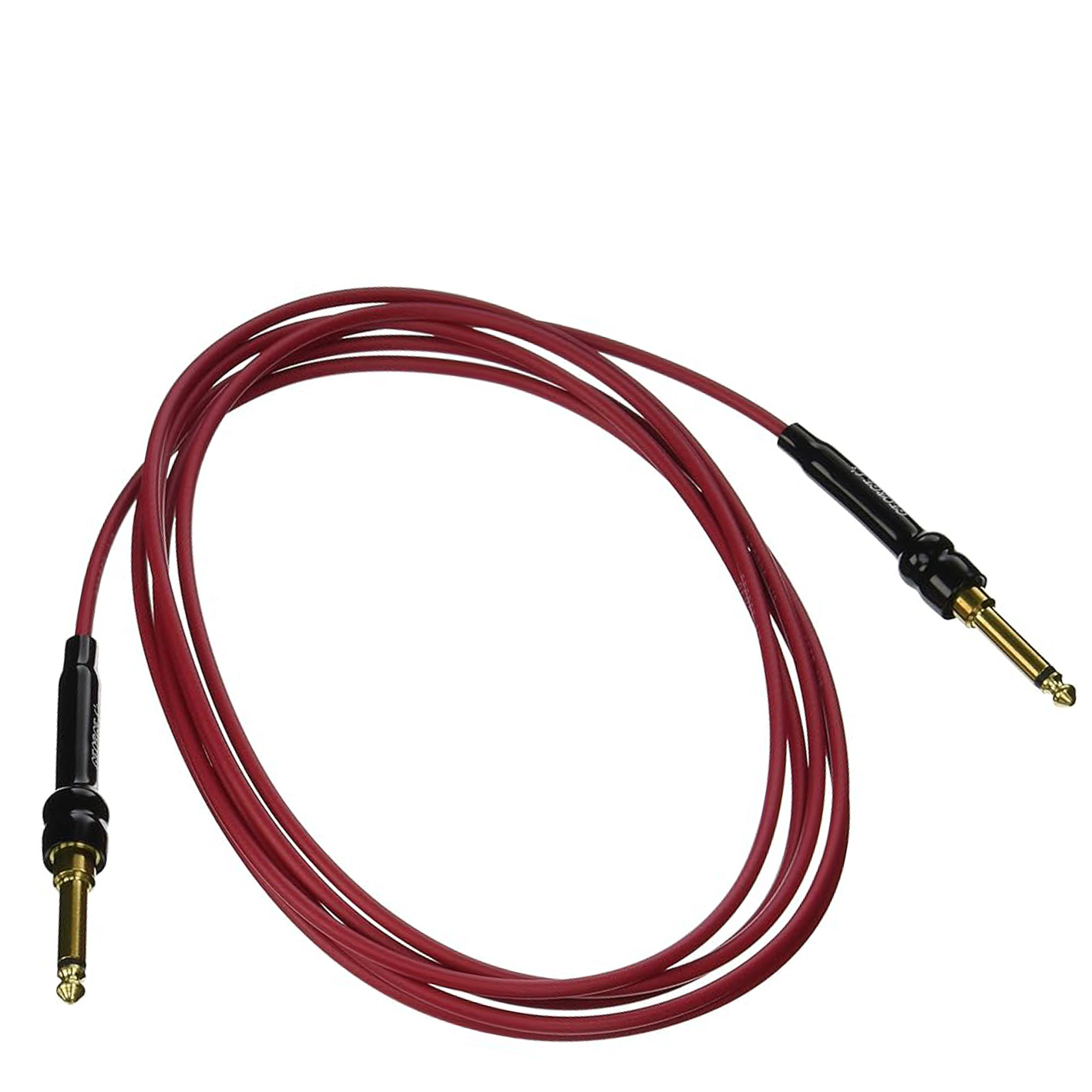
Low capacitance is the name of the game here, giving you probably the best value per meter on the market today. This means you get an incredibly clear guitar tone, and when switching from higher capacitance cables you’ll feel like a veil has been taken off your amp speaker. The gauge of the cable is also very thin, which makes it particularly lightweight but still incredibly durable.
Load the next 2 products...
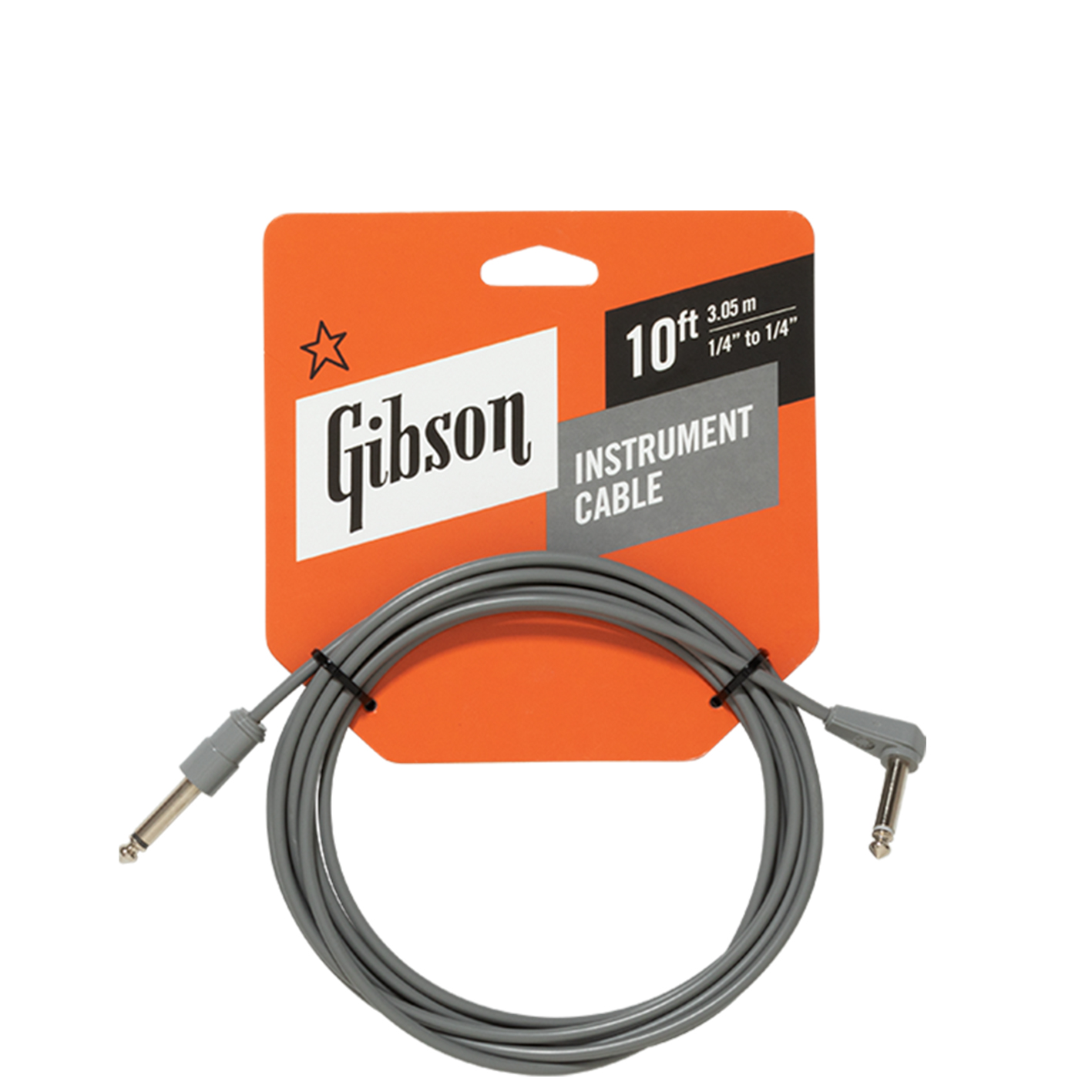
Aside from the vintage aesthetic, these cables feature everything you’d want from a modern cable – they’re fully shielded to prevent unwanted electrical interference. They’re manufactured by Switchcraft too, which is known for creating high-quality parts.
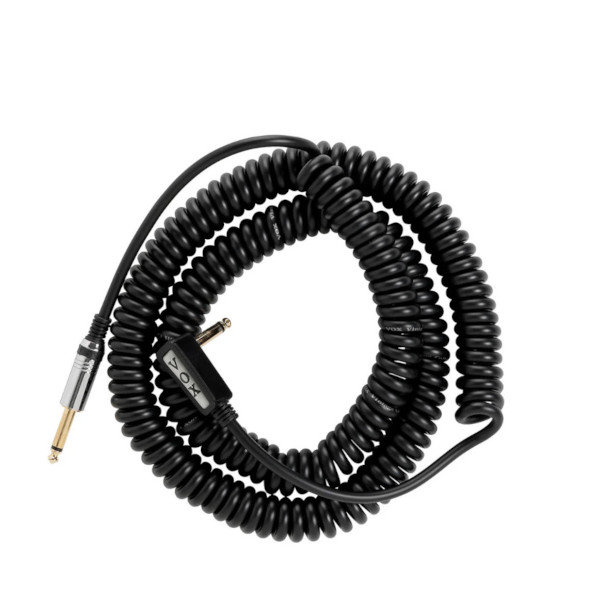
A classic-looking cable that has a multi-gauge design which provides dynamic and full sound without the treble loss you might expect from such a cable. Copper conductors help deliver pure and crystal clear audio and there's also double shielding.
Best overall
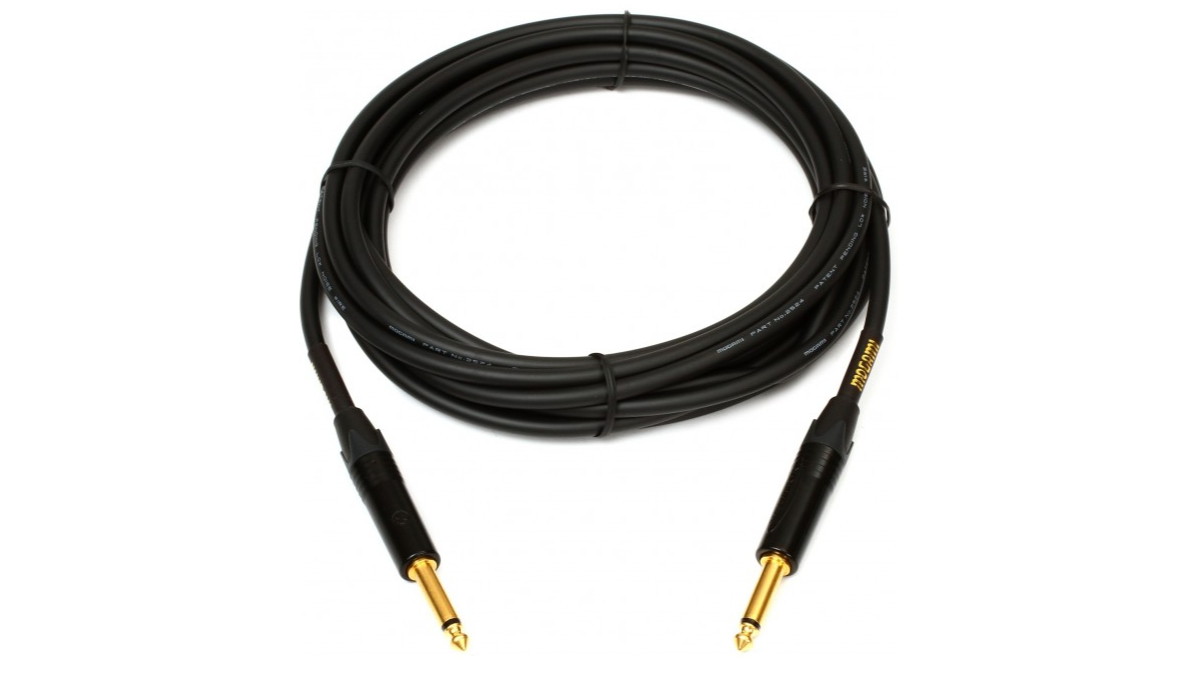
1. Mogami Gold Series Guitar Cable
Our expert review:
Specifications
Reasons to buy
Reasons to avoid
✅ Buy if you want top reliability: Mogami are in a league of their own when it comes to reliability and precision in their guitar cables.
❌ Avoid if you're on a tight budget: The quality of the Mogami gold series guitar cable comes at a cost, so look elsewhere if saving the pennies.
Hailing from Nagano, Japan, Mogami swiftly earned its reputation as the preferred option for seasoned musicians in search of the utmost reliability and precision in signal transfer.
The Mogami Gold Series cable is widely regarded as the best guitar cable on the market for good reason, regularly topping best-of lists thanks to its high-quality construction and excellent sound transfer.
It features a heavy gauge, oxygen-free copper core with an ultra-high density spiral shield, which means a minimum of interference in your guitar signal. To help with noise reduction, the outer cable construction is conductive carbon-impregnated PVC.
The quality doesn’t stop there and Mogami’s gold jack connectors ensure optimal signal integrity, so you won’t have any issues with frustrating breakup.
It comes in an array of lengths to meet the needs of everyone from bedroom warriors to the regularly touring musician, and when something comes with a lifetime warranty, you know it means business.
Best on a budget
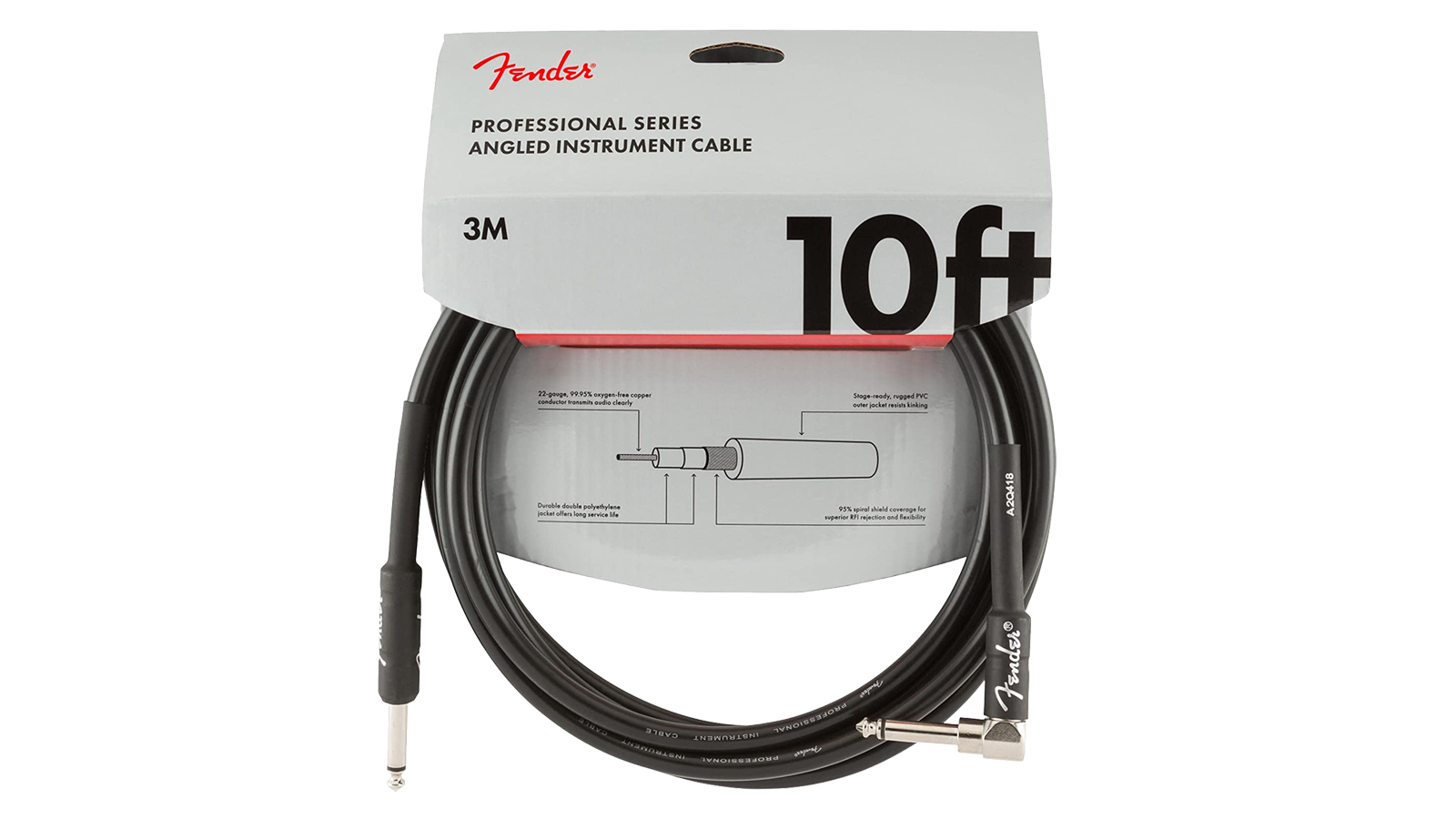
2. Fender Professional Series Guitar Cable
Our expert review:
Specifications
Reasons to buy
Reasons to avoid
✅ Buy if you're looking for a great value for money cable: If you're on a budget, you can't go wrong with the Fender Professional Series.
❌ Avoid if you want a good choice of colours: There are a number of cable lengths to choose from, but colour options are limited.
Manufactured to the same exacting standards as the company's guitars and iconic tube amps, Fender Professional Series cables provide players with a cost-effective option for all their cabling needs. Whether you need to wire up a pedalboard or plug in on a large stage, the Professional Series will do so with budget-friendly convenience.
The wide gauge of this cable offers a reassuring feel, despite its low price compared to some of the other cables on this list. The outer PVC jacket also has a ‘physical memory’ to prevent it from getting tangled, no matter how badly you wrap it up after rehearsal.
Featuring 95% OFC spiral shielding, it reduces unwanted noise and interference to a minimum, transparently delivering your guitar tone. Available in a huge number of lengths, you won’t have to look far to find one of these to meet your needs. Although the connectors aren’t gold plated, that's perhaps no surprise given the wallet-friendly cost.
Best for style
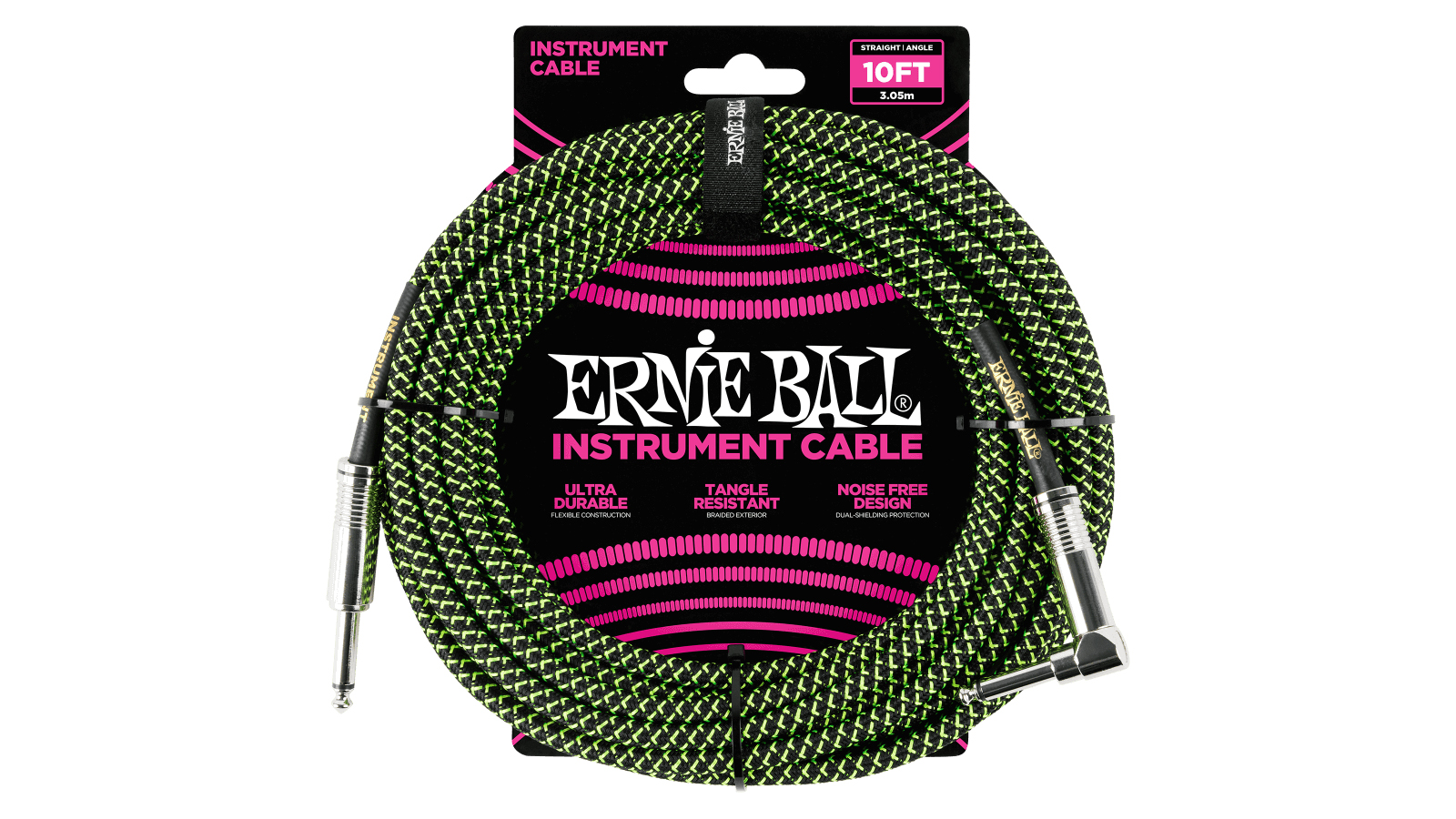
3. Ernie Ball Braided Guitar Cable
Our expert review:
Specifications
Reasons to buy
Reasons to avoid
✅ Buy if you want a tangle free experience: Thanks to Ernie Ball's tangle-resistant braided sleeve, you'll not have to spend time working out a spaghetti-like bundle after unpacking it.
❌ Avoid if you want a selection of cable lengths: Check how much cable you need, as these cables won't cater for every situation.
The Ernie Ball Braided Cables eschew the tired old black cable aesthetic for something far edgier. Ensuring excellent sonic transfer, these high-quality cables offer excellent durability and look great whilst doing it.
Braided cables are far more resistant to tangling than their PVC-covered cousins while also offering a reliability upgrade due to the hardy exterior. This means these cables will be more than adequate to stand up to the use and abuse of life on the road.
Dual conductors reliably transfer your guitar tone clearly with crisp highs, tight mids and rich harmonics. It’s a very well-shielded cable that delivers a minimum of interference and susceptibility to extraneous noise. Although there is plenty of color choice, the limited cable length options may not make them applicable for every situation, particularly pedalboards.
Best for connections
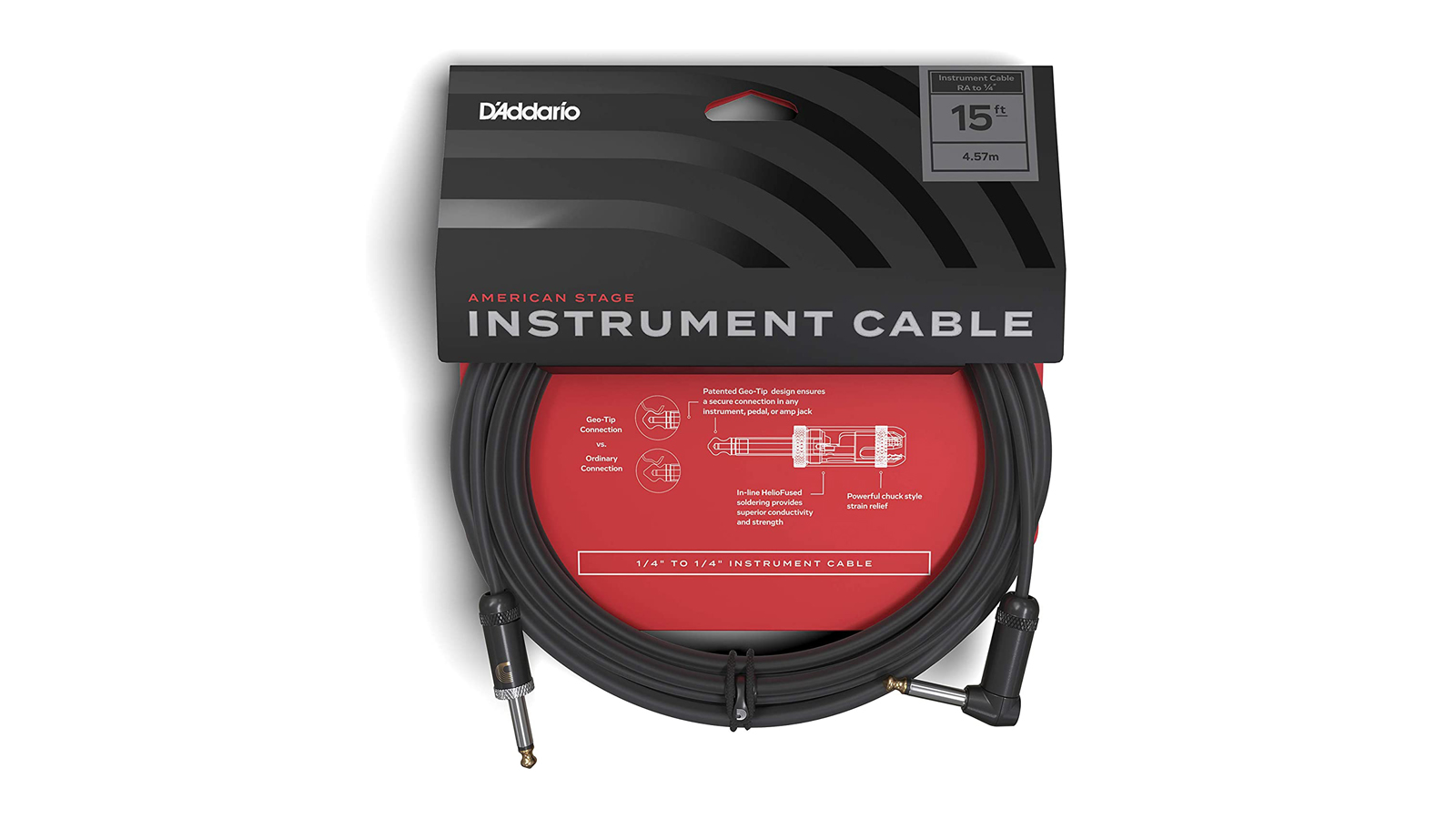
4. D'Addario Planet Waves American Stage Guitar Cable
Our expert review:
Specifications
Reasons to buy
Reasons to avoid
✅ Buy if you want some of the best connectors in the business: The D'Addario Planet Waves boast Geo Tip Neutrik connectors - a solid, dependable choice.
❌ Avoid if you want some cable variety: Colour options and cable lengths are limited, so bear that in mind before purchasing.
Planet Waves by D’Addario has been manufacturing guitar cables for a long time now, so it knows a thing or two about making a cable that can put up with the rigors we guitar players like to put them through. The American Stage guitar cable upholds D’Addario’s fantastic reputation, and for the quality it delivers, it comes at a very reasonable price.
Perhaps the best feature of the American Stage cable is its connectors. Neutrik is widely acknowledged as producing the best connectors in the business. It's a comforting sight knowing that their exceptional components are part of the package. The Geo Tip connectors on offer ensure a rock-steady connection, no matter what kind of guitar you play. The connectors use HelioFused soldering to connect the inner cabling for added reliability.
This is a low-capacitance, audiophile-grade cable for transparent tone transfer, with an oxygen-free copper conductor for exceptional signal transfer. It utilizes 95% tinned copper braiding, virtually eliminating noise and interference.
Best for recording
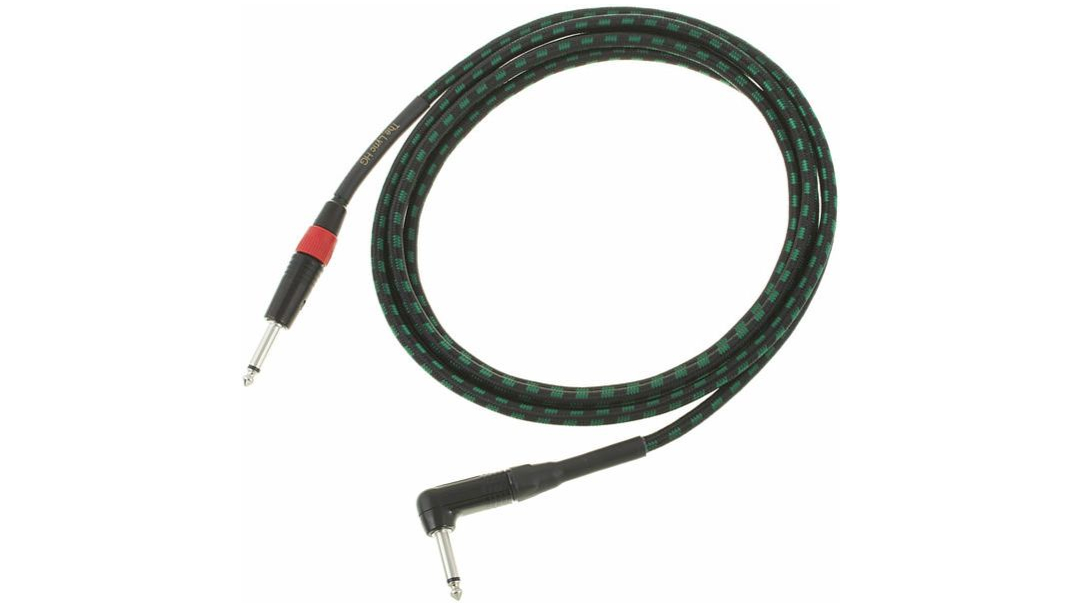
5. Evidence Audio Lyric HG Guitar Cable
Our expert review:
Specifications
Reasons to buy
Reasons to avoid
✅ Buy if you want a really robust cable: The Evidence Audio Lyric HG Guitar Cable is durable and it also has Neutrik connectors.
❌ Avoid if you rely on pedalboards: That durability means the cable is pretty stiff, so not ideal for pedalboards.
When you’ve got endorsements from Dave Gilmour, Jeff Beck and Guthrie Govan, you know you’re doing something right. Evidence Audio’s Lyric HG guitar cable is a premium offering for guitarists that take their tone seriously.
The dual solid core is made of refined IGL copper which is what gives this cable its incredibly transparent tone transfer, as well as its stiff construction. This cable features Neutrik connectors and TRT Wonder Solder so it will put up with plenty of strain.
It’s hard to fathom the effect a guitar cable can have on your sound, but we saw a noticeable difference using these cables. There was more body and definition in our guitar tone with plenty of bite and attack once the break-in period was through.
However, this Evidence cable may be best left in the studio. Not only is it super expensive and cables often mysteriously go missing at venues, but its stiffness can make it a little awkward to move about on stage, being rather restrictive. On the other hand, if you’re in the studio, accept no substitutes.
Best lightweight cable
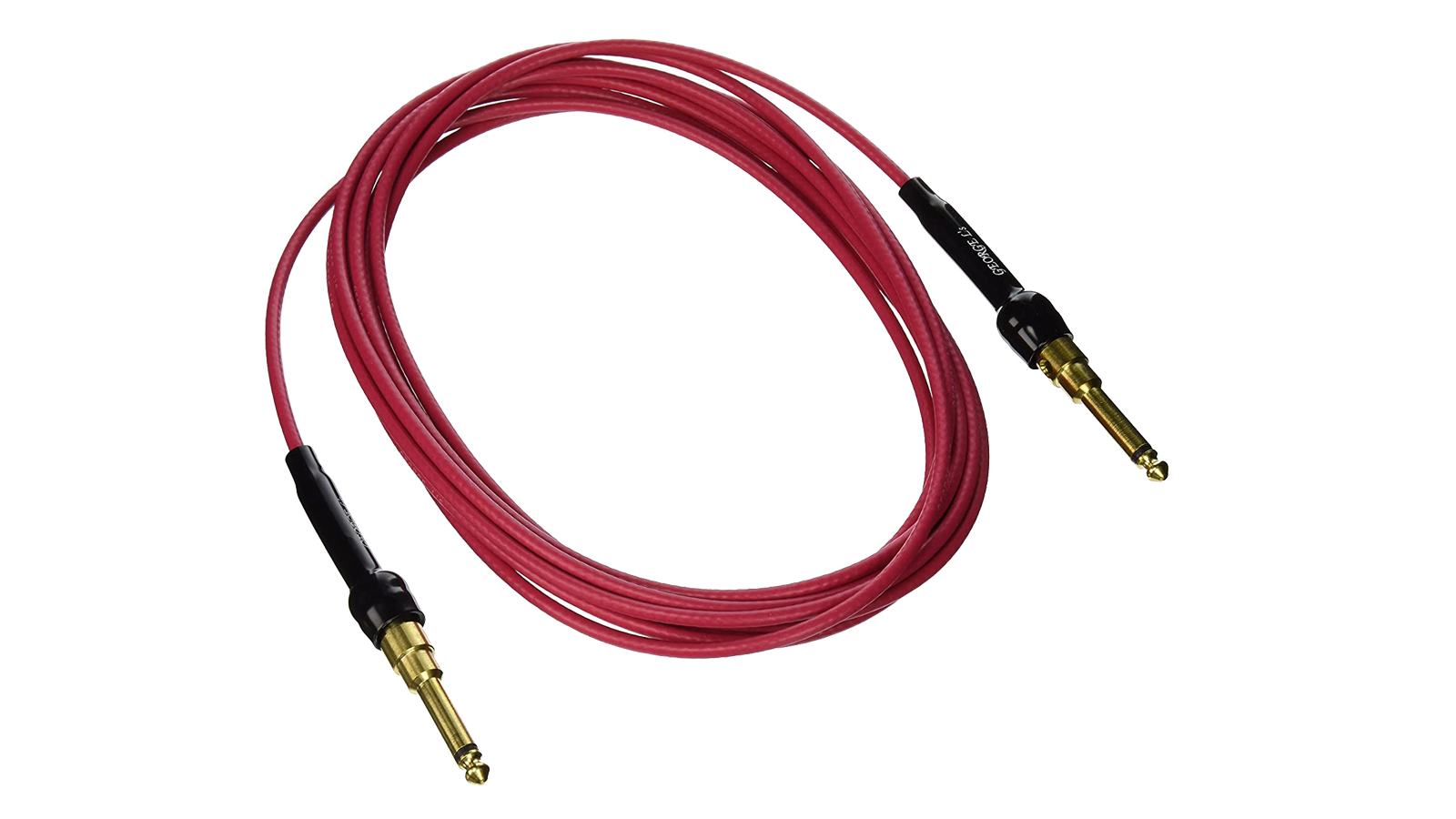
6. George L's .155 Guitar Cable
Our expert review:
Specifications
Reasons to buy
Reasons to avoid
✅ Buy if you want a lightweight cable with low capacitance: The George L's .155 is light and durable and provides a clear guitar tone.
❌ Avoid if tangles drive you mad: The lightweight build of the cable can result in some tangles. Grab the Ernie Ball cable mentioned above to avoid getting in a fankle.
George Lewis made his name selling cable in bulk, allowing guitar players to custom spec lengths for their particular needs. This ready-made version of George L’s cable means you can get that renowned sound instantly.
Low capacitance is the name of the game here, giving you probably the best value per meter on the market today. This means you get an incredibly clear guitar tone, and when switching from higher capacitance cables you’ll feel like a veil has been taken off your amp speaker.
The gauge of the cable is very thin, which makes it particularly lightweight but still incredibly durable. It is somewhat susceptible to tangling when longer lengths are used, but the quality of tone transfer more than makes up for it.
Although there’s nothing too fancy about the connectors, they are adequately durable and give you a comforting ‘click’ when slotted into your output jack. No complaints here.
Best vintage
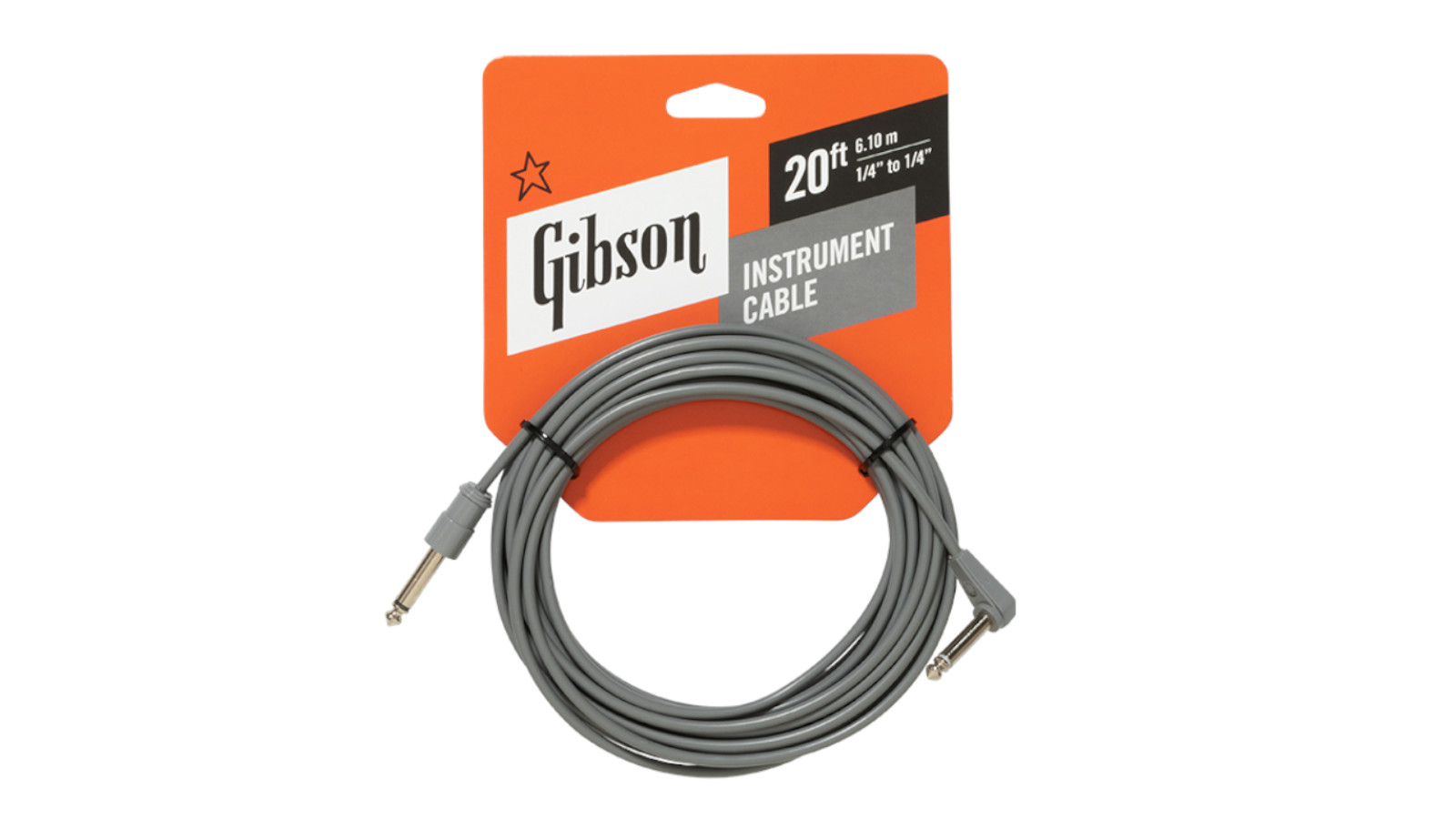
7. Gibson Vintage Original Instrument Cable
Our expert review:
Specifications
Reasons to buy
Reasons to avoid
✅ Buy if you want a vintage look to go with your guitar: The grey finish is distinctively retro and will suit your vintage-style guitar perfectly.
❌ Avoid if you like your cable style a bit more modern: This cable definitely won't be for everyone and its looks could jar with a more modern shredder.
Taking inspiration from cables of the 1950s and 1960s, this offering from Gibson is perfect for lovers of all things vintage.
With authentic connectors and a distinctive grey finish, it’s ideal for pairing with your Golden Era Gibson.
Aside from the vintage aesthetic, these cables feature everything you’d want from a modern cable – they’re fully shielded to prevent unwanted electrical interference.
They’re manufactured by Switchcraft too, which is known for creating high-quality parts. It’s made using very low capacitance conductors to ensure that your tone remains untouched.
All in all, this is a fantastic, functional guitar cable with plenty of old-school character.
Best coiled
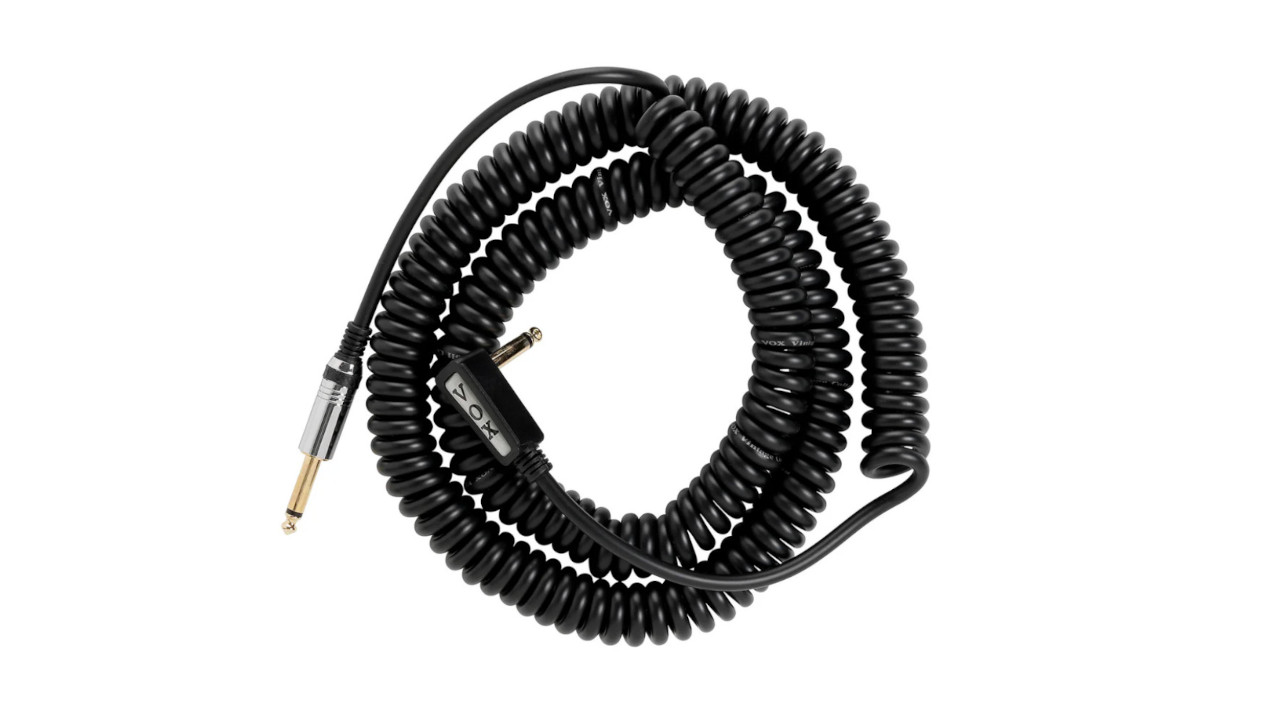
8. Vox Vintage coiled cables
Our expert review:
Specifications
Reasons to buy
Reasons to avoid
✅ Buy if you don't want interference ruining your tone: The double shielding protects your playing from unwanted noise.
❌ Avoid if coiled cables are a bit too retro for you: The coiled cable's aesthetic simply won't be to everyone's taste.
Coiled cables aren’t for everyone, but the likes of Jimi Hendrix and Brian May can attest to them, so if you’re seeking a cable steeped in classic rock history, then this is definitely one to check out.
Its unique multi-gauge design boasts a dynamic and full sound, with little top-end roll-off giving you a true vintage vibe without the treble loss associated with more traditionally designed coiled cables.
High grade OFC copper conductors mean that your sound remains pure and clear. It also features double shielding which helps prevent unwanted interference ruining your tone.
From a more practical point of view, coiled cables also allow for a bit of give when playing standing up. If you step a little too far away from your amp while plugged in, you’ll feel the cable uncoil slightly, instead of just popping out of the input.
More we've tested
We test a lot of cables here at Guitar Player. While we would point you to the top 7 highlighted above first, these are more cables we've also loved recently.
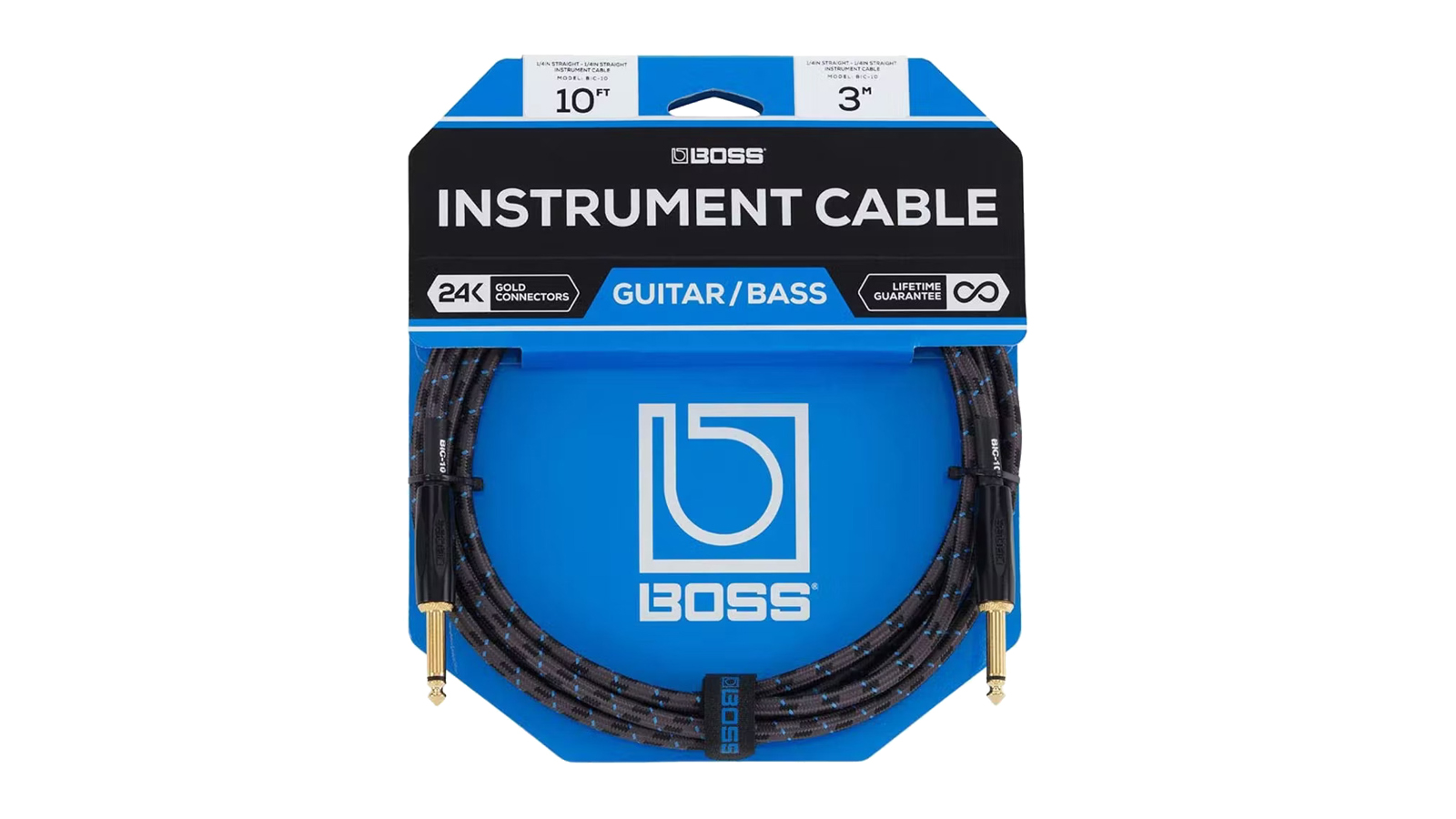
Boss Instrument Cable
Our expert review:
Specifications
Reasons to buy
Reasons to avoid
✅ Buy if you want value for money when it comes to gold-plated connectors: Boss cables are great value for money and are robust to boot.
❌ Avoid if you have a bit more cash to spend: Spending a little more will reward you with a more premium guitar cable.
Renowned for its world-famous, indestructible effects pedals, Boss also has a range of fantastic guitar accessories. Boss Instrument Cables offer outstanding value for money, giving you a cable that’s reliable and durable without costing the earth.
A studio-grade, oxygen-free copper core delivers transparent tone transfer, whether you’re going straight to your guitar amp or wiring up a pedalboard. The 24K gold-plated contacts have been custom-designed for maximum sound reproduction.
The braided exterior prevents any unwanted tangling whilst further enhancing the reliability of this cable. Boosting longevity is another key perk; if you're tired of swapping cables after every gig, snag one of these. Boss' woven jacket is one of the most durable in the business and considering its price, this is seriously impressive.
Available in a wide variety of lengths, including patch cables as well as the solderless pack for wiring your pedalboard, this is one of the best value guitar cables you can buy today.
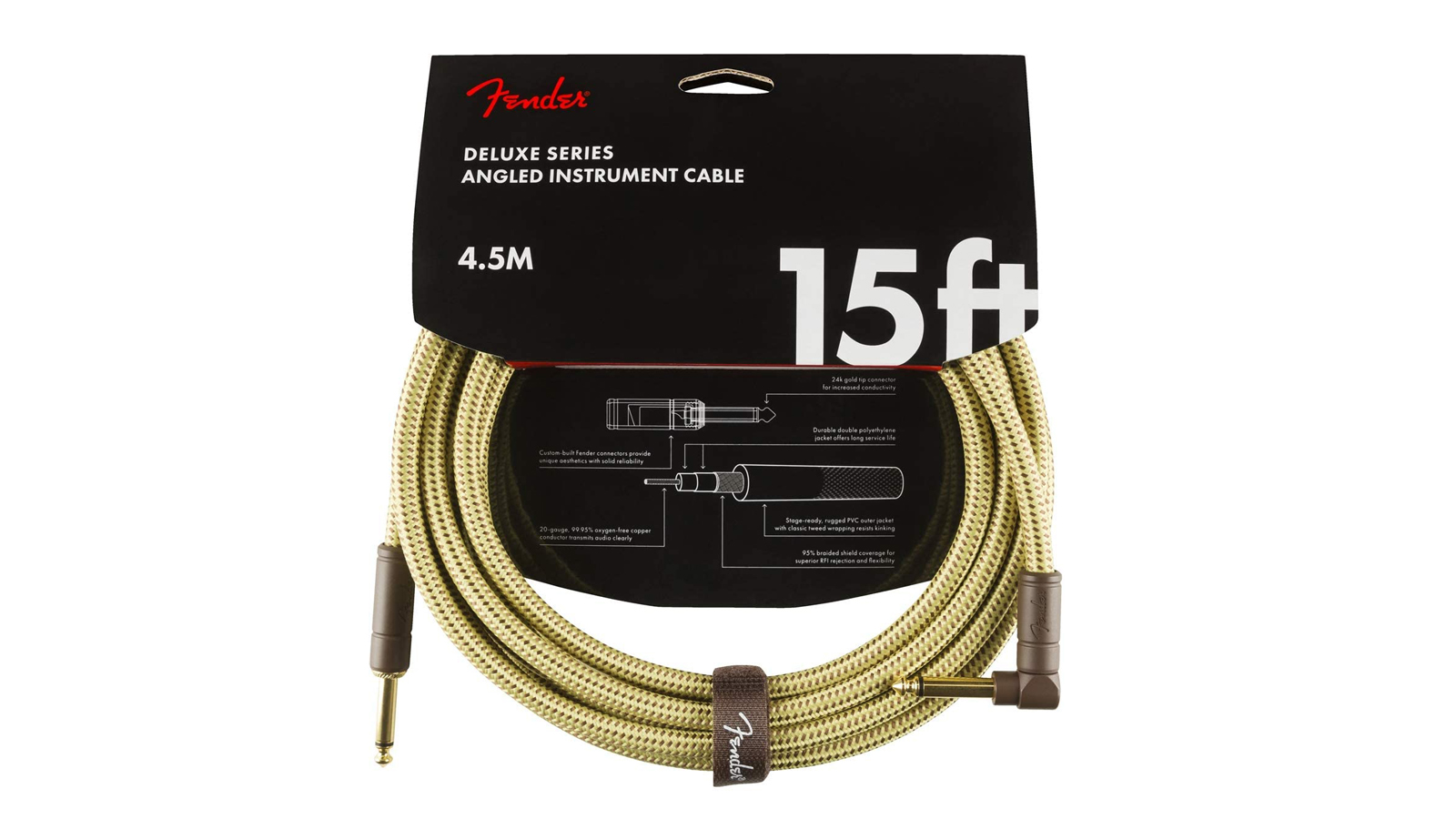
Fender Deluxe Series Guitar Cable
Our expert review:
Specifications
Reasons to buy
Reasons to avoid
✅ Buy if you want a cable with a lifetime warranty: The Fender Deluxe Series is rock solid option is has custom-moulded 24-karat gold-plated connectors.
❌ Avoid if a premium cable is top of your shopping list: There's certainly nothing wrong with this Fender cable, but those wanting a pure premium option should look elsewhere.
When a cable carries a lifetime warranty and the Fender brand name, you know it means business. Despite not being the first name that comes to mind when you think of cables, these are extremely high quality.
Custom-molded 24-karat gold-plated connectors deliver a solid and reliable connection, strong enough to put up with plenty of abuse. It’s a thick-gauge cable too, which feels nice and solid, working in tandem with the braided jacket to prevent any unwanted tangling.
Unlike other braided cables, this one isn’t overly stiff, so if you’re looking for a stage cable, this is a brilliant choice.
Excellent shielding prevents interference from clouding your pristine guitar tone, while there are various size options, from pedalboard-friendly sizes to 25-foot length, that will cover the biggest stages.
Moreover, if the yellow tweed isn’t to your taste, Fender also produces it in black for those after something a little more discreet.
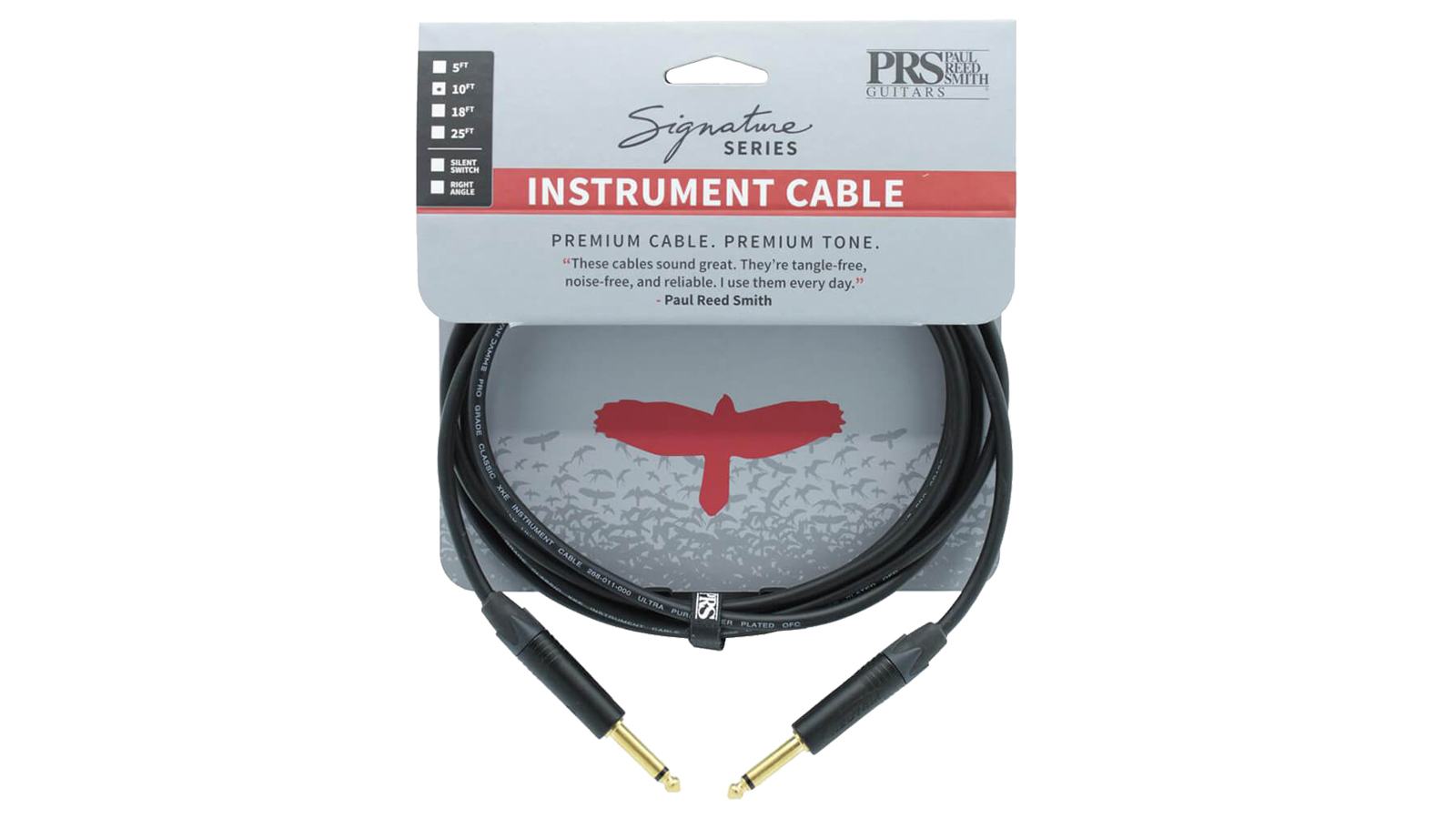
PRS Signature Series Guitar Cable
Our expert review:
Specifications
Reasons to buy
Reasons to avoid
✅ Buy if you want a premium guitar cable: The PRS Signature Series is a serious, durable, lightweight cable that gives you bright and crystal clear tones.
❌ Avoid if you want a cable with a bit more substance to it: While durable, this cable might be a little too thin for some players' preferences.
As well as making high-quality guitars, PRS also offers a premium guitar cable that’s handmade in London. Made in tandem with Van Damme Cabling, you’re getting a serious guitar cable here, one that’s used by the Foo Fighters, Radiohead, and many more.
This cable features Neutrik connectors, which are probably the most reliable on the planet, so you know it’s going to put up with plenty of abuse. The cable is lightweight thanks to the small diameter but still retains a premium feel to match its price.
A carefully tuned capacitance value means your guitar tone remains bright and crystal clear. It’s available in various lengths with right angle and straight jack options, plus you can upgrade to silent connectors for additional investment.
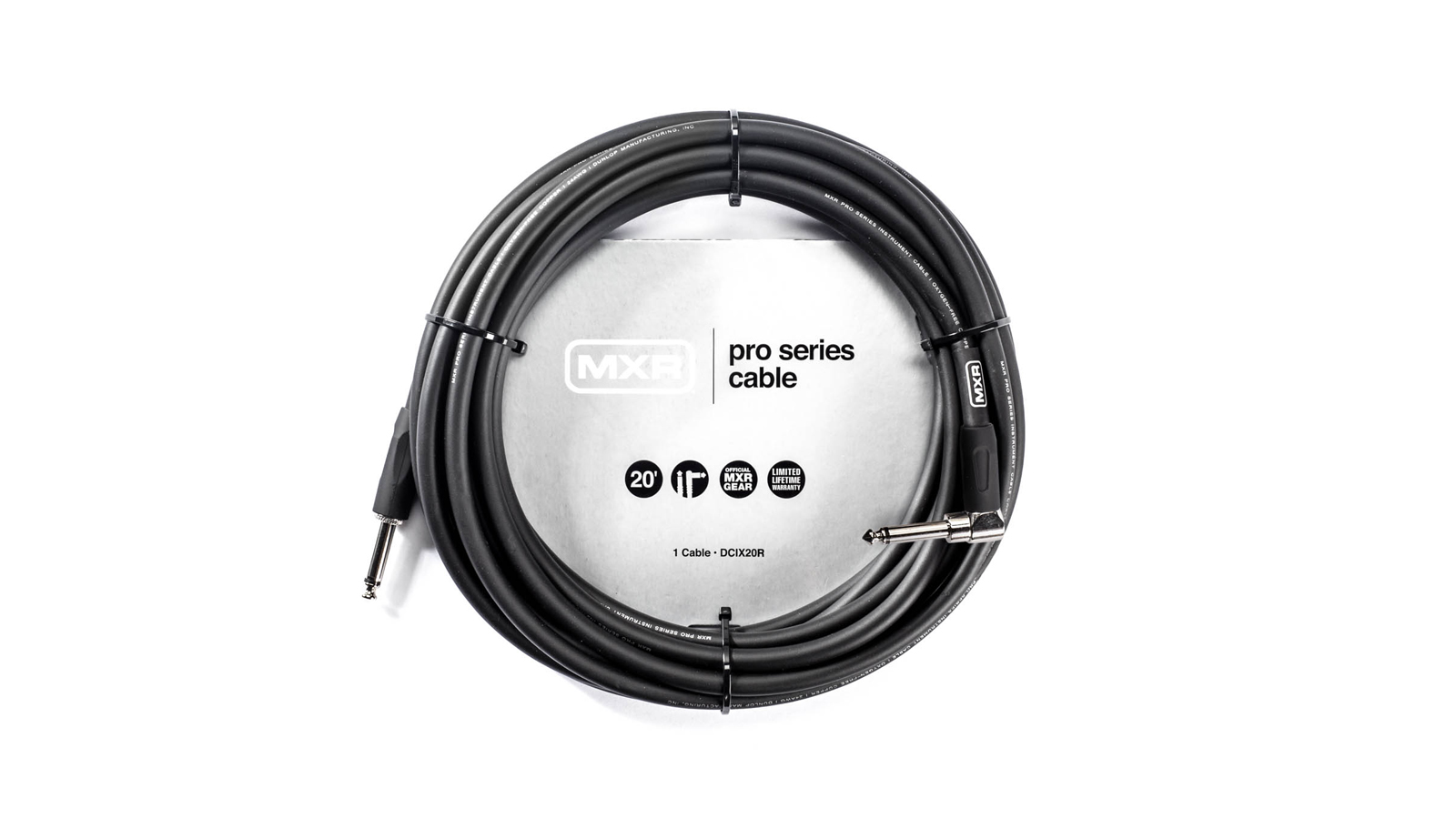
MXR Pro Series Guitar Cable
Our expert review:
Specifications
Reasons to buy
Reasons to avoid
✅ Buy if you want a no-nonsense cable that does the job nicely: The MXR Pro Series cable has great build quality and will be a solid addition to your cable box.
❌ Avoid if you want to buy a cable that offers a good variety of lengths: This is a dependable guitar cable but its appeal is curtailed by a lack of length options.
MXR’s Pro Series guitar cable offers the outstanding build quality you’d expect from any subsidiary of Jim Dunlop, one of the great guitar accessory manufacturers. This means this cable comes with a guarantee of long life and reliable performance.
A high-quality, 24 AWG oxygen-free copper center conductor delivers your tone reliably and transparently, whilst the 19-strand spiral shielding prevents any unwanted noise from entering your signal chain. While the connectors may not exude luxury, they provide everything you need – they are well-sealed, sturdy, and provide a reliable connection.
The PVC jacket is flexible, yet still firm enough to assist in preventing any unwanted tangling or kinks. It’s extra thick so will put up with you standing on it repeatedly just as easily as it will with frequent coiling and uncoiling. Since this cable is a winner in our books, it’s unfortunate that MXR doesn't offer it in more lengths. That aside, there’s not much to complain about and this MXR cable delivers on all fronts.
How to buy the best guitar cable for you
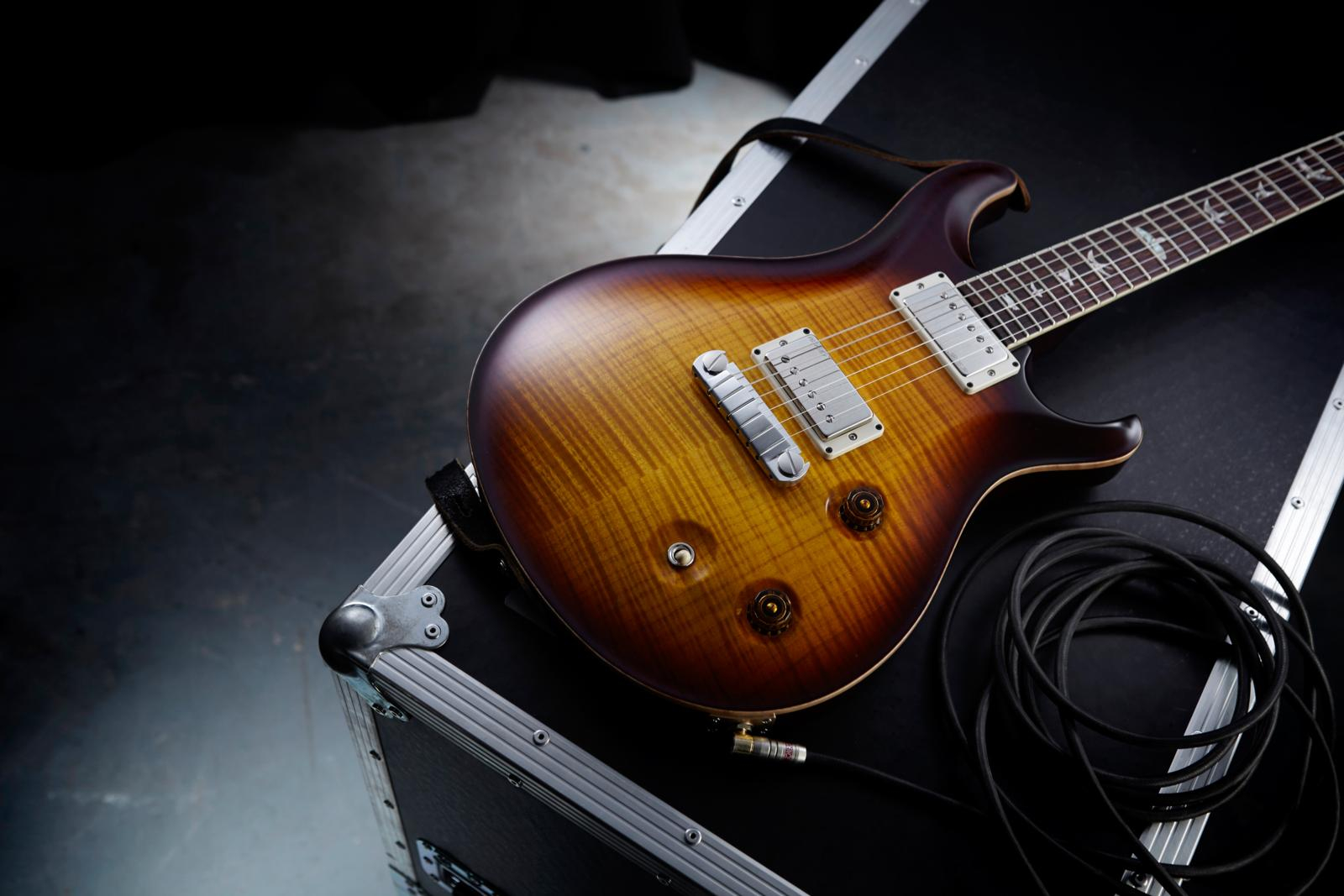
When buying the best guitar cable, you’d be forgiven for just grabbing the first one you see and being done with it. We get it, it’s not the most exciting thing in the world. The more you understand about how cables are constructed, however, the more you’ll understand the potentially unwanted effects cheap cables can have on your guitar tone. Budget guitar cables can introduce unwanted noise into your signal chain and their connectors often fail, usually at a most inopportune moment such as when you’re mid-way through your set. Save yourself the faff, and add a high-quality guitar cable to your rig.
The first thing you’ll want to look at is the connector. This is where a guitar cable is most likely to fail, so having a high-quality connector is a must if you want the best reliability and tone transfer. Neutrik connectors are amongst the best in the world, so keep an eye out for cables with these kinds of connectors as you know you’ll be getting a quality product. Your connector is subject to the highest stresses out of all the components in your guitar cable. Constant plugging and unplugging as well as the potential for pressure to be applied by accidentally stepping on your cable or catching it in something means that a top-quality connector is key.
FAQ
Does cable length matter?
It’s always best to try and future proof any new purchase as best you can, while sticking to budget and getting all of the features you need.
With a cable, you might know exactly the length you need – if it’s for home or studio use, you probably know the distance you need (remember, you’ll need to allow for the distance between the guitar and floor, and the amp and floor).
However, if you’re playing regular shows, then it’s likely you’ll be playing stages that are different in size. You don’t want to find yourself on a bigger stage and not have the cable length to allow yourself to roam around, so keep that in mind!
Of course with cables, the longer it is, the more capacitance it will have. So, if you want to keep your tone as pure as possible but you need some spare length, look for low capacitance cables.
What is capacitance in a guitar cable?
All cables have a certain amount of inherent capacitance. Some of the electrical charge that passes through the cable is held. The effecting result for guitar players is that the higher capacitance a cable has, the more you’ll hear your tone slightly dulled.
Usually, it’s the top-end frequencies that will be less prominent – you might notice that your tone isn’t quite as bright. If you want to keep that sparkly high treble frequency range, then you’ll be better served by a low capacitance cable.
Low capacitance cables keep your signal purer, allowing a fuller frequency range to be represented through your amp. Low capacitance isn’t always better though – there are some players that use this to tame particularly bright sounding guitars.
Do more expensive guitar cables make a difference?
The best guitar cables can be made from a range of materials. Usually, the core is made from copper as this is a good conductor. They’ll then have some sort of shielding to help prevent electrical interference and an outer jacket to protect it all.
Stiffer outer jackets can be good for keeping everything inside in good working order, but might not be flexible for stage use. The more shielding a cable has, the less unwanted noise you’re likely to get. Guitar cables aren’t balanced and many cheap cables with poor shielding will pick up external interference.
Sturdy connectors are another key component to look out for when shopping for the best guitar cables. The point where the cable joins to your guitar takes a lot of the pressure if pulled taut, so good connectors can extend its lifetime.
What do I need to know about connectors?
You can trust Guitar Player.
The metal connectors are the part of the cable that undergo the most stress. Any time you move whilst your guitar is plugged in, the cable moves slightly and the plug remains in place, causing tiny amounts of stress. Good quality connectors, like Neutrik, can withstand this stress and keep going for years and years.
Conversely, cheap connectors are often the first thing to break on lesser quality cables and will mean you get a horrible crackly sound, or it will cut out completely.
Do gold-plated connectors make a difference?
If you’ve been on the hunt for the best guitar cables you’ve probably noticed one thing, gold-plated connectors. However, do gold-plated connectors make a difference or is it just a marketing trick? Well, the former is true, especially if you look at cable performance under a microscope. Gold connectors are much more conductive and, therefore, offer you better performance and a truer signal transfer. Gold is also less prone to corrosion, so if you take care of your cables and have them for years, gold connectors will hold up better over time.
However, noticing the sonic differences between gold and nickel connectors is a little harder to do in the real world – if you do a blind test, you’ll struggle to notice the sound difference. Also, rusty connectors aren't exactly a widespread problem with most cables – unless you're dealing with serious budget options. So, chances are, this won't be much of a headache for you.
How we choose the best guitar cables
Here at Guitar Player, we are experts in our field, with many years of playing and product testing between us. We live and breathe everything guitar related, and we draw on this knowledge and experience of using products in live, recording and rehearsal scenarios when selecting the products for our guides.
When choosing what we believe to be the best guitar cables available right now, we combine our hands-on experience, user reviews and testimonies and engage in lengthy discussions with our editorial colleagues to reach a consensus about the top products in any given category.
First and foremost, we are musicians, and we want other players to find the right product for them. So we take into careful consideration everything from budget to feature set, ease of use and durability to come up with a list of what we can safely say are the best guitar cables on the market right now.
Read more on how we test gear and services at Guitar Player.
Meet the experts

Matt has been recording bands since the mid-noughties, cutting his teeth with an M-Audio M-Track 2 and a copy of Cubase on Windows XP. Since then he's used countless audio interfaces to record music for bands across the UK, covering everything from djent to jazz. As a MusicRadar writer, Matt has reviewed 15 audio interfaces in the past year alone, and over 50 different products including guitars, amps, and pedals. Before becoming a writer, he spent five years in the music retail industry working for Dawsons Music and Northwest Guitars, providing expert advice to musicians. He’s currently studying Music Production at Spirit Studios in Manchester, UK.

After spending a decade in music retail, Richard is now a freelance writer for MusicRadar, Guitar Player, Guitar World and Reverb, specialising in electric and acoustic guitars, bass, and almost anything else you can make a tune with. When his head’s not buried in the best of modern and vintage gear, Richard runs a small company helping musicians with songwriting, production and performance, and plays bass in an alt-rock band. Otherwise, you'll probably find him out walking the dog!

Ross has been a music lover and guitar player since the age of 8. He has spent the five years since graduating from university working in music retail, selling guitars, amps and more. Ross is particularly interested in electric guitars, pedals and amplifiers and his current rig includes a trusty 2009 American Standard Stratocaster and Vox AC30S1 with a few Walrus Audio and Way Huge pedals in between.
Latest updates
10/04/25: The guide has been updated to include the Vox Vintage coiled cable. All products featured in the guide now have added "At a glance" sections for quick reference. The FAQ section has been rewritten and expanded to provide more information. A "Meet the experts" section has also been included highlighting the writers behind the guide.
Read more
- The best guitar capos for acoustic and electric guitar
- Here are the best pedalboard power supplies
All the latest guitar news, interviews, lessons, reviews, deals and more, direct to your inbox!

Matt is a Junior Deals Writer here at Guitar Player. He regularly tests and reviews music gear with a focus on guitars, amps, pedals, modelers, and pretty much anything else guitar-related. Matt worked in music retail for 5 years at Dawsons Music and Northwest Guitars and has written for many music sites, including MusicRadar, Guitar World, Guitar.com, Ultimate Guitar, and Thomann’s t.blog. When not writing for Guitar Player, you'll find him making a racket with northern noise punks Never Better.
